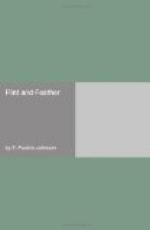These are the men of action, who need not the world’s
renown,
For their valour is known to England’s throne
as a gem in the British crown;
These are the men who face the front, whose courage
the world may scan,
The men who are feared by the felon, but are loved
by the honest man;
These are the marrow, the pith, the cream, the best
that the blood contains,
Who have cast their days in the valiant ways of the
Riders of the Plains;
And theirs is the kind whose muscle makes the power
of old England’s jaw,
And they keep the peace of her people and the honour
of British law.
Then down with the cur that questions,—let
him slink to his craven den,—
For he daren’t deny our hot reply as to “who
are our mounted men.”
He shall honour them east and westward, he shall honour
them south and north,
He shall bare his head to that coat of red wherever
that red rides forth.
’Tis well that he knows the fibre that the great
North-West contains,
The North-West pride in her men that ride on the Territorial
plains,—
For of such as these are the muscles and the teeth
in the Lion’s jaw,
And they keep the peace of our people and the honour
of British law.
[2] The above is the Territorial pet name for the North-West Mounted Police, and is in general usage throughout Assiniboia, Saskatchewan and Alberta. At a dinner party in Boston the writer was asked, “Who are the North-West Mounted Police?” and when told that they were the pride of Canada’s fighting men the questioner sneered and replied, “Ah! then they are only some of British Lion’s whelps. We are not afraid of them.” His companions applauded the remark.
SILHOUETTE
The sky-line melts from russet into blue,
Unbroken the horizon, saving where
A wreath of smoke curls up the far, thin air,
And points the distant lodges of the Sioux.
Etched where the lands and cloudlands touch and die
A solitary Indian tepee stands,
The only habitation of these lands,
That roll their magnitude from sky to sky.
The tent poles lift and loom in thin relief,
The upward floating smoke ascends between,
And near the open doorway, gaunt and lean,
And shadow-like, there stands an Indian Chief.
With eyes that lost their lustre long ago,
With visage fixed and stern as fate’s decree,
He looks towards the empty west, to see
The never-coming herd of buffalo.
Only the bones that bleach upon the plains,
Only the fleshless skeletons that lie
In ghastly nakedness and silence, cry
Out mutely that naught else to him remains.
A PRODIGAL
My heart forgot its God for love of you,
And you forgot me, other loves to learn;
Now through a wilderness of thorn and rue
Back to my God I turn.
And just because my God forgets the past,
And in forgetting does not ask to know
Why I once left His arms for yours, at last
Back to my God I go.




